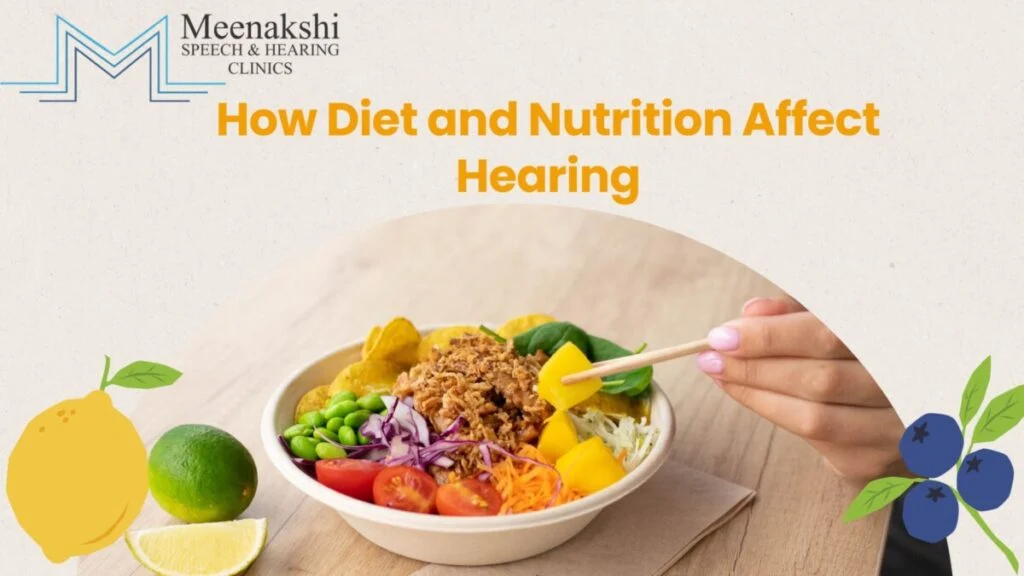Maintaining good health is good for hearing and the ear. Go for regular check-ups and protect yourself from noisy environments. What you eat can improve your auditory system and even improve it. At Meenakshi Speech and Hearing Clinic, we understand that your hearing health involves the regular check-up and hearing aid. On the other aspect, we looked at the role of diet and nutrition in maintaining optimal ear health. Research shows that what you eat can directly influence your ability to hear and protect from hearing loss. In this blog, we will explore the link between diet and hearing health and provide insights on foods for better hearing.
Importance of Diet for Hearing Health
The health of our auditory system, including the structure of the inner ear, depends upon blood circulation, nerve function, and cell regeneration. The body also gets some nutrition when you eat healthy food, so that way our ear also requires essential minerals, vitamins, and nutrition to function effectively. A poor diet can contribute to your hearing loss, such as tinnitus or increased sensitivity to noise. Nutrition-rich foods help to protect the interior structure within the ear, including the cochlea, which is responsible for transmitting sound to the brain.
Foods for Better Hearing
Incorporating certain nutrition into your daily diet can impact your health health. Here are some key nutrition and food diets that maintain your hearing health:
Omega-3 Fatty Acids: Omega-3 is found in fish like salmon, mackerel, and sardines and is known for promoting heart health. It helps to improve the blood circulation in the inner ear and may reduce the risk of age-related hearing loss by supporting the overall health and auditory system.
Food rich in Omega-3s;
- Fatty fish (salmon, tuna)
- Walnuts
- Flaxseeds
- Chia seeds
Antioxidants (Vitamins A, C, and E): Antioxidants protect the delicate hair cells in the inner ear and protect them from damage caused by free radicals. Free radicals can damage these cells, leading to hearing loss over time. It also protects your immune system, which can help prevent ear infections and other ear-related issues.
Foods rich in antioxidants
- Berries (blueberries, strawberries)
- Leafy greens (spinach, kale)
- Citrus fruits (oranges, lemons)
- Nuts and seeds
Vitamin B12: It plays a vital role in nerve health, including the auditory nerve that transmits sound signals to the brain. A deficiency in B12 is linked to tinnitus (ringing in the ear) and hearing loss, particularly in older adults.
Foods rich in Vitamin B12:
- Lean meats (chicken, turkey)
- Dairy products (milk, cheese)
- Eggs
- Fortified cereals
Magnesium: It is essential for protecting the ears from noise-induced hearing damage. It helps the delicate hair cells in the inner ear by preventing them from being damaged by excessive noise. Magnesium also supports blood flow and oxygenation in the auditory system.
Foods rich in magnesium:
- Spinach
- Quinoa
- Almonds
- Avocados
Zinc: Zinc is important for immune health, which helps in preventing ear infections and supporting overall all body processes. Zinc also plays a role in cell growth and repair, which is beneficial for maintaining a healthy inner ear structure.
Foods rich in zinc:
- Oysters
- Beef
- Pumpkin seeds
- Chickpeas
Folate: Folate, or vitamin B9, helps in the inner ear, which helps them to get oxygen and nutrients it needs. Studies suggest that folate deficiency can increase the risk of hearing loss, particularly age-related hearing loss.
Foods rich in folate:
- Beans and legumes
- Broccoli
- Brussels sprouts
- Leafy greens
Potassium: Potassium regulates the fluid in the inner ear. Age by age, potassium level is decreasing, which can affect the hearing and also create serious issues in the ear.
Food rich in potassium:
- Bananas
- Potatoes
- Spinach
- Tomatoes
- Lima beans
Nutrition of Ear Health
Nutrition for ear health isn’t about only protecting against hearing loss but also helping in supporting the complex system that allows one to hear. The auditory system requires proper blood flow, healthy hair cells, and protection from oxidative stress. Consuming a balanced diet full of vitamins and minerals helps to ensure your ears are protected from damage, infection, and other issues that can affect your hearing.
Risk of Poor Nutrition on Hearing
A diet lacking in key nutrition can have detrimental effects on your hearing health. Lack of minerals and vitamins can lead to the deterioration of hair cells in the cochlea, poor circulation, and even an increased risk of ear infection. This can also contribute to hearing problems such as tinnitus, noise-induced hearing loss, and age-related hearing decline.
Conclusion
The connection between diet and hearing health is clear—what you eat can influence your auditory well-being. By incorporating foods that are rich in essential nutrients like omega-3, antioxidants, and minerals. It can help to protect your ears and maintain good hearing for years to come.
At Meenakshi Speech and Hearing Clinic, we believe in protecting your hearing and taking care of your overall health, including your diet. By prioritizing nutrition for ear health, you can reduce the risk of hearing loss and maintain optimal hearing well into later years. Remember that what you eat can affect your auditory health, so make mindful choices to help maintain hearing health.
For more personalized advice on maintaining your health, visit Meenakshi Speech and Hearing Clinic, where our experts properly guide you and are also ready to assist you with comprehensive hearing care service.
Book an appointment through the website or call us!


